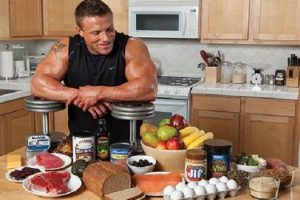Sports nutrition plays a pivotal role in the performance and overall health of athletes. Among the diverse dietary choices available, vegetarianism has gained popularity in recent years. Many athletes are adopting vegetarian diets for various reasons, including ethical, environmental, and health concerns. However, the transition to a vegetarian diet can raise questions about meeting the nutritional needs essential for sports performance. In this comprehensive article, we will delve deep into the world of vegetarianism and sports nutrition, exploring how athletes can maintain their competitive edge while excluding meat from their diets.
Understanding Vegetarianism
Vegetarianism is a dietary choice that abstains from consuming meat, but it allows for various levels of flexibility. Different forms of vegetarianism include lacto-vegetarian (including dairy but no meat), ovo-vegetarian (including eggs but no meat), lacto-ovo vegetarian (including dairy and eggs but no meat), and vegan (excluding all animal products).
- Ethical and Environmental Motivations: People adopt vegetarian diets for reasons such as animal welfare, reducing their environmental impact, and health improvements.
- Diverse Vegetarian Approaches: Vegetarianism isn’t a one-size-fits-all approach. Athletes can choose the type of vegetarian diet that aligns with their values and preferences.
Meeting Protein Needs
Protein is a critical component of an athlete’s diet, as it plays a significant role in muscle repair, recovery, and overall performance. Meeting protein needs without meat can be accomplished through plant-based sources.
- Legumes: Foods like beans, lentils, and chickpeas are excellent sources of plant-based protein.
- Tofu and Tempeh: These soy-based products are rich in protein and can be used in various dishes.
- Nuts and Seeds: Almonds, peanuts, chia seeds, and hemp seeds are protein-rich options.
- Quinoa: This grain is a complete protein source, containing all nine essential amino acids.
- Dairy and Eggs (for lacto-ovo vegetarians): Dairy products and eggs provide high-quality protein for those who include them in their diet.
Essential Nutrients for Vegetarian Athletes
In addition to protein, vegetarian athletes must pay attention to various essential nutrients to support their training and recovery.
- Iron: Plant-based sources of iron include lentils, tofu, spinach, and fortified cereals. Pair iron-rich foods with vitamin C sources for better absorption.
- Calcium: Dairy products (for lacto-vegetarians), fortified plant milks, tofu, and leafy greens like kale are good calcium sources.
- Vitamin B12: B12 is primarily found in animal products, so many vegetarians may need to consider supplements or fortified foods.
- Omega-3 Fatty Acids: Flaxseeds, chia seeds, and walnuts are sources of plant-based omega-3s, but some athletes opt for algae-based supplements.
- Zinc: Nuts, seeds, legumes, and whole grains can provide zinc, but phytates in plant foods can hinder absorption.
- Vitamin D: Exposure to sunlight and fortified foods can help vegetarian athletes meet their vitamin D needs.
Balancing Macronutrients
A well-rounded vegetarian diet should balance macronutrients, including carbohydrates and fats, to support energy levels and overall health.
- Carbohydrates: Whole grains, fruits, and vegetables provide essential carbohydrates for energy during workouts.
- Fats: Incorporate healthy fats from sources like avocados, nuts, seeds, and olive oil.
Hydration and Fluid Balance
Hydration is vital for athletes regardless of their dietary choices. Staying well-hydrated is crucial for optimal sports performance and overall health.
- Water: Ensure you drink enough water throughout the day, and pay attention to your fluid intake during training sessions.
- Electrolytes: Vegetarian athletes can lose electrolytes through sweat. Consider sports drinks or electrolyte supplements, especially during long and intense workouts.
Meal Planning for Athletes
Effective meal planning is essential for vegetarian athletes to ensure they meet their nutritional needs.
- Balanced Meals: Each meal should include a balance of protein, carbohydrates, and healthy fats. Consider nutrient-dense options such as quinoa and vegetable stir-fries.
- Snacking: Healthy snacks like yogurt, nuts, and fruit can help maintain energy levels between meals.
- Post-Workout Nutrition: After exercise, prioritize foods rich in carbohydrates and protein to support recovery.
Supplements: When Are They Necessary?
While a well-planned vegetarian diet can meet most nutritional needs, supplements may be necessary for specific nutrients like B12 and omega-3 fatty acids.
- Consult a Healthcare Professional: A registered dietitian or healthcare provider can help assess your specific nutritional requirements and recommend appropriate supplements.
Personalization and Experimentation
Vegetarianism is not a one-size-fits-all approach, and what works for one athlete may not work for another. Personalization is key.
- Experiment with Foods: Try various plant-based protein sources and recipes to find what works best for you.
- Monitor Your Health: Regular health check-ups and blood tests can help ensure you are meeting your nutritional needs.
Conclusion: Thriving as a Vegetarian Athlete
In conclusion, vegetarianism and sports nutrition can harmoniously coexist, allowing athletes to meet their nutritional needs while excluding meat from their diets. With careful planning and consideration of essential nutrients, vegetarian athletes can maintain their competitive edge and achieve their performance goals. Personalization, experimentation, and expert guidance from healthcare professionals or registered dietitians can help ensure that vegetarian athletes thrive in their chosen sport and enjoy the numerous benefits of a plant-based diet.





Add Comment